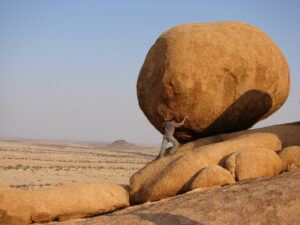If Judy Blume can write a whole book in 2 hours a day, so can you
There are many downsides to living through a pandemic, but having SCBWI (The Society of Children’s Book Writers and Illustrators) move their annual summer conference online wasn’t one of them. This move opened up the conference to so many people who wouldn’t normally be able to attend due to the high cost of travel or time away from work. Plus, it attracted amazing speakers like Philip Pullman and Judy Blume, two of my personal favorites. This year, I’m attending the Summer Spectacular online and it’s shown me how today’s writing superstars experienced many of the same challenges and setbacks we do.
Yesterday morning I got up, brewed my coffee, and danced around the kitchen with my sons. I was about to see Judy Blume, author of Otherwise Known as Sheila the Great (a childhood favorite), speak.
Judy Blume was lovely, helpful, and humble. And, she told us we could write a whole book by writing just two hours a day. Really? She did it when her children were in preschool. If Judy Blume could write so many unforgettable books while raising children so could I, right?
If you want to be a writer, start small. Too many writers get derailed by setting big, impossible goals or expecting to do too much in a day. Writers get frustrated and give up when writing a good book takes so much longer than they anticipated (I’ll qualify the statement with the word ‘good’). The lesson in many of the author talks was not to give up. Judy Blume received rejections for two years before she was traditionally published. Kwame Alexander self-published 14 books before he found an agent. All these amazing writers had one thing in common, a daily writing routine.
Give yourself a daily goal that is too small to fail. Then, celebrate every tiny achievement. This will give you the motivation to keep showing up.
Bigger is Not Better
As many people are starting to realize, bigger is not always better. Our desire for bigger portions is leading to an alarming rise in obesity (along with diabetes and heart disease). We want bigger houses and fancier cars even if it means working longer hours and assuming larger household debt. We’re encouraged to have big dreams, to make millions of dollars or become successful entrepreneurs. Those already doing it offer expensive courses to help us get there, promising big results.
The truth of the matter is, when it comes to actually following through, we need to downsize our big goals. Bigger is not better when it comes to habit shaping.
The quest for instant gratification hurts us, it keeps us from sticking to projects and doing things for enjoyment rather than just results.
There are many benefits to small. Small goals are achievable, they build confidence, they’re more fun, and they’re less intimidating.
The Recipe
In the book, Atomic Habits, James Clear shares his recipe for sustained success:
- Decide the type of person you want to be
- Prove it with small wins
If you want to be a writer, change your idea of a writer to someone who is consistent, creative, and reliable rather than a natural born genius who writes one book and knocks it out of the park.
If I learned anything from listening to all the successful writers at this year’s SCBWI Summer Spectacular, it’s that none of these writers achieved super stardom the first time they set out to write a book. Instead, they experienced rejection and kept at it, day after day.
“Determination is just as important as talent.”- Judy Blume
Prove you’re a writer with small wins. If you set small daily goals and hit them, you’ll prove to yourself you can do it. You can move forward on your book. If you write for even a few minutes a day consistently, you’ll eventually complete your first draft.
The Benefits of Small
Small goals are achievable
Entrepreneur Gary Keller advocates relentless focus on one single goal at a time.
“Success demands singleness of purpose…It is those who concentrate on but one thing at a time who advance in this world.”- Gary Keller, The One Thing: The Surprisingly Simple Truth Behind Extreme Results.
When I try to cook and read at the same time, I burn dinner. If I get lost in a book or start taking notes on a new writing idea I have, I forget to stir and end up scraping burnt rice off the bottom of the pan. Don’t multitask during your writing session. Focus on one project at a time.
Choose one small goal. Maybe your goal is to just outline a blog post or write a character sketch. Don’t get greedy and try to add extras. I guarantee you won’t write a setting and character sketch that’s any good if you rush it. If your goal is tiny and you write even more, you’ll feel like you did extra credit. This feeling of accomplishment will keep you coming back. If, on the other hand, you set too big of a goal and fail to achieve it, you’ll feel bad and be less motivated to write the next day.
If you still have doubts, Shaunta Grimes shares how small goals made her a real writer here.
Small goals build confidence
In the example above, when you completed your small goal, you felt good. If you did anything above and beyond your goal, you felt great. These feelings build confidence and start to cement your new writer’s identify. When you’re showing up consistently to do creative work, you’ll feel like a writer.
After enough time, you’ll finish a draft of your book or publish a blog post, a goal that seemed so faraway and impossible when you began your writing journey.
Keep hitting your small goals and eventually you’ll reach your big ones.
Small goals are fun
When your daily goal is small, the writing process is not so intimidating. It’s actually fun. There’s no need to be too precious with your writing, especially if you know you’ll be back, day after day.
The one thing I took away from the writer/illustrator talk yesterday with Dan Santat and LeUyen Pham is the importance of experimentation and not being too precious with your work.
LeUyen Pham draws on an IPad because she can experiment and create all she wants without wasting paper. She finds this freeing and she’s able to take more risks than she would when confronted with a blank page. She experiments to get the colors just right on her IPad before she even pulls out her paint. When she finally does, she knows exactly what she wants to do with color.
Dan Santat talked us through his process of writing picture books. He uses a journal and spends months or even longer writing down ideas until he finally comes up with the right concept. He spends the majority of his time developing this concept through experimentation. His notebook was full of hundreds of ideas and random thoughts. When he finally finds the one he wants to write, he often writes five or six versions of the idea from different viewpoints and in different ways. After he does this, he mixes the drafts by pulling them apart and putting them back together like a jigsaw puzzle.
Both illustrators play with ideas, color, and words. Brainstorming is not wasted writing time. It’s important to the process.
If you’re in a rush to bang out a novel in a month NaNoMo write style, you’ll miss this time for exploring. If instead you use your quick book draft for experimentation, as a piece of work to pull apart and put back together, it may be a useful.
Don’t be afraid to play with words and have fun while writing. Make it your goal to write, not just to finish.
Takeaways
Our bigger is better, hustle culture is harmful to the writing process and will get in the way of establishing our daily writing habit. Not only is it unrealistic, but it will lead to feelings of inadequacy and failure. If you want to write a book, start with small goals and watch your wins stack up. Even writing superstars struggle. I’ll leave you with this thought to encourage you to experiment and hearten you on your way.
“I’m a rewriter. If I died during a first draft, no one would know what I was trying to do, including me. I’m learning with my first draft.” – Judy Blume, SCBWI Summer Spectacular interview





